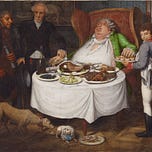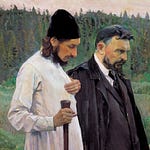This is an updated, expanded, and edited version of a talk originally given at the Western American Diocese Pastoral Conference in San Francisco, CA, 18 March 2014
CONTINUED FROM A PREVIOUS POST
FASTING AND PHYSIOLOGY
Enough theory and theology! This talk is supposed to be about practical things. Let us assume that everyone here believes in and tries to follow the spiritual path which is offered by Orthodox Christianity, and that we all know that this path necessarily includes the discipline of the body, a small part of which is the discipline of that sack of flesh called the stomach. So, what do we know about this organ? All too often people say that they cannot fast because they need protein. When asked why they think that they need more protein than most other Orthodox Christians who observe the fast, it turns out that these people rarely have a good idea of how much protein their body really needs, or which foods contain protein and how much, or what else they may need besides protein. In most cases, these people simply find it very inconvenient to change their regular diet or to deprive themselves, and that seems to be the reason they say that they need more protein. Let us take a closer look at our bodies’ real needs.
This is not a college course on human physiology, so we will keep things very simple. When it comes to food, our bodies basically need three things: carbohydrates, proteins, and fats, of which only protein and fats are essential. We also need vitamins and minerals, of course, but people usually do not complain that they do not get enough vitamins during a fast - even if they really do not get enough - but that is for a different reason, which has nothing at all to do with fasting. A varied diet which is plentiful in such foods as whole grains, raw green vegetables, legumes, nuts, seeds, and fresh fruit should provide enough vitamins, calcium, iron, and other necessary elements.
The amount of carbohydrates, protein, and fat that a person needs depends on the person’s age, sex, and lifestyle. But before we get into the exact amounts, let us first very briefly discuss what these nutrients do for us.
Der Völler by Georg Emanuel Opiz, 1804
Listen to this episode with a 7-day free trial
Subscribe to Phroneo to listen to this post and get 7 days of free access to the full post archives.












